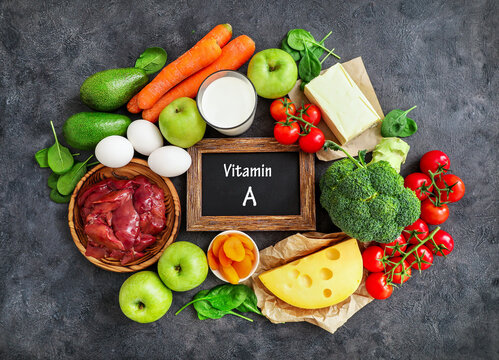Vitamin A is a fat-soluble vitamin that plays a critical role in various bodily functions. It’s essential for maintaining good vision, supporting immune function and promoting healthy skin.

Why is Vitamin A important?
Vitamin A is crucial for maintaining healthy vision, supporting the immune system, and promoting cell growth and development. It also plays a role in the health of your skin and mucous membranes.
Deficiency of Vitamin A :
Vitamin A deficiency can lead to various health issues, including:
- Night blindness: Difficulty seeing in low light conditions.
- Dry eyes: Insufficient tear production leading to dryness and discomfort.
- Skin problems: Increased susceptibility to infections and poor wound healing.
- Impaired immune function: Reduced ability to fight infections and illnesses.
- Growth retardation: Slowed growth and development, especially in children.
- Increased susceptibility to infections: Weakened immune system making individuals more prone to illnesses.

Vitamin A food sources :
Fruit Sources of vitamin A :
Fruits are generally not high in vitamin A compared to vegetables and animal products, but some fruits contain beta-carotene, which the body can convert into vitamin A. Fruit sources of vitamin A include:
- Mangoes: Rich in beta-carotene, which the body converts into vitamin A.
- Cantaloupe: Contains beta-carotene and other carotenoids that contribute to vitamin A intake.
- Papaya: Another fruit with beta-carotene, supporting vitamin A levels.
- Apricots: These orange fruits provide beta-carotene and some vitamin A.
- Persimmons: Contain beta-carotene, contributing to vitamin A intake.

Vegetable Sources of vitamin A:
Vegetables are excellent sources of vitamin A, particularly those that are dark green, orange, and yellow in colour. Some vegetable sources of vitamin A include:
- Carrots: Rich in beta-carotene, which the body converts into vitamin A.
- Sweet potatoes: High in beta-carotene and a good source of vitamin A.
- Spinach: Contains beta-carotene and other carotenoids that contribute to vitamin A intake.
- Kale: Another leafy green rich in beta-carotene and vitamin A.
- Butternut squash: Provides beta-carotene and vitamin A.
- Pumpkin: Contains beta-carotene and provides vitamin A.

Animal source of vitamin A :
- Liver: Especially beef liver, which is exceptionally rich in vitamin A.
- Fish liver oils: Cod liver oil is a notable source of vitamin A.
- Eggs: Particularly the yolks, which contain vitamin A.
- Dairy products: Milk, cheese, and butter are sources of vitamin A, depending on fortification and fat content.
How Vitamin A helps in vision?
Vitamin A is essential for maintaining good vision because it contributes to the production of a pigment called rhodopsin, which is found in the retina of the eye. Rhodopsin is crucial for the eye’s ability to detect light and helps with night vision. Additionally, Vitamin A supports the health of the cornea and other eye tissues.

Why does vitamin deficiency occur?
Vitamin A deficiency can occur due to insufficient intake of vitamin A-rich foods, poor absorption of vitamin A from the diet, or conditions that increase the body’s demand for vitamin A. It’s common in areas where diets lack diversity and in populations with limited access to nutritious foods.
How to cure vitamin deficiency?
The treatment for vitamin A deficiency often involves increasing consumption of vitamin A-rich foods, such as those mentioned earlier. In severe cases, supplements may be necessary under medical supervision. Additionally, addressing underlying factors that may contribute to poor absorption or increased demand for vitamin A is essential for long-term management.

How much Vitamin A is required per day ?
The recommended daily allowance (RDA) for Vitamin A varies depending on age and gender. For adult men, it’s around 900 micrograms per day, and for adult women, it’s about 700 micrograms per day.
Benefits of Vitamin A:
Vision support: Essential for maintaining good vision, particularly night vision, and overall eye health.
Immune function: Helps the immune system function properly, supporting the body’s defence against infections and illnesses.
Skin health: Supports the health of the skin by promoting cell turnover and wound healing.
Growth and development: Important for normal growth and development, especially in children.
Reproduction: Plays a role in reproductive health and foetal development during pregnancy.
Bone health: Contributes to bone growth and remodelling, helping to maintain strong and healthy bones.


1 thought on “Vitamin A : Benefits, Food Sources, Deficiency”